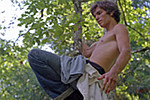 Shadows off the beaten path
Shadows off the beaten pathREC 2 | 24 CITY
< < F O R E I G N > >
last update 7.May.10
See also: SHADOWS FILM FESTIVAL
 R E V I E W B Y R I C H C L I N E
R E V I E W B Y R I C H C L I N E
scr Tamio Hayashi
prd Yasushi Udagawa
with Atsushi Ito, Kengo Kora, Mikako Tabe, Gaku Hamada, Mirai Moriyama, Nao Omori, Kiyohiko Shibukawa, Toshimitsu Ohkawauchi, Noriko Eguchi, Hidekazu Mashima, Takashi Yamanaka, Kazuki Namioka
 release Jpn 20.Mar.09,
release Jpn 20.Mar.09, UK 28.May.10
09/Japan 1h52
 With a lively tone and an intricately plotted multi-strand story, this Japanese drama holds our attention using humour, drama and an end-of-the-world scenario. It's also a thoroughly charming bit of filmmaking.
With a lively tone and an intricately plotted multi-strand story, this Japanese drama holds our attention using humour, drama and an end-of-the-world scenario. It's also a thoroughly charming bit of filmmaking.
As a cataclysmic comet approaches in 2012, three guys consider the ahead-of-its-time Japanese punk band Gekirin (meaning "wrath"), which released Fish Story in 1975, a year before the Sex Pistols formed. As they wonder whether music can save the world, we flash back 37 years to meet the bandmates (including Ito and Kora) struggling to stay afloat; shy Masashi (Hamada) in 1982 trying to work out the song's secret message; a cult awaiting Nostradamus' 1999 world-ending event; and a baker (Moriyama) and lost girl Asami (Tabe) who encounter terrorists in 2009.
Filmmaker Nakamura takes a bright, comical approach with a fast pace and snappy dialog, plus flashes of action and emotion. And it also helps that the title song is fiendishly catchy. As it leaps through the decades, the film intriguingly traces the path of a piece of music and its role in events along the way, from romance to violence. The most fleshed-out strand follows the rocky creation of the fateful record, which the producer (Omori) assures them will never sell anyway.
The cast is excellent, effectively weaving each person's story into the film's bigger plot with big personalities and interaction that's often fiery and sometimes touching. On the other hand, it's also somewhat tenuous and fragmented, not to mention random, although it's entertaining to see how each bit of the story fits together into the momentous lifespan of this one song, plus the badly translated book it quotes. And all of this is nicely tied up in a wonderfully clever coda.
Discussions of justice and chance abound, looking at ways people can make a difference in society and make sense of the world. The title Fish Story alone generates a superb discussion about exaggerated claims and personal responsibility. Even more interesting is the song-creation process, as the band grapples with originality versus commerce and tries to figure out how they fit into a society that ignores them. Yet they have no choice but to sing. And they might just save the planet in the process.
5.May.10
 R E V I E W B Y R I C H C L I N E
R E V I E W B Y R I C H C L I N E
prd Emilie Blezat
scr John Cheetham, Andrew Kötting, Andrew Mitchell
with Jacob Auzanneau, Jean-Luc Bideau, Adelaide Leroux, Aurelia Petit, Xavier Tchili, Capucine Aubriot, Manon Aubriot
 release Fr 20.Jan.10,
release Fr 20.Jan.10, UK 23.Jul.10
09/France 1h36

 Even more difficult and artistic than Kotting's THIS FILTHY EARTH, at least this fairy tale-style drama isn't pretentious. It's gorgeously shot and acted with raw authenticity, but the narrative is difficult to engage with.
Even more difficult and artistic than Kotting's THIS FILTHY EARTH, at least this fairy tale-style drama isn't pretentious. It's gorgeously shot and acted with raw authenticity, but the narrative is difficult to engage with.
Alex Ivul (Auzanneau) is a rebelling against the very idea of growing up, mainly because it means he can't be as physically close to his teen sister Freya (Leroux). After his father (Bideau) has a furious reaction to their suggestive play-acting, Alex climbs on the roof and vows to never touch the ground again. As Freya is sent to Russia to find a husband, Alex lives in the trees, making their mother (Petit) sick with worry. And things get worse when their father has a stroke.
Kotting's filmmaking skills are considerable. The cinematography is sharp and evocative, capturing the characters' inner moods as the seasons change around them. And the sound mix is an astonishing blend of ambient noise, atonal effects and music that drifts from jaunty to haunting in a split second. All of this combines to keep us nicely off balance; the film is never boring even though we often feel like we're missing the point.
Clearly, Kotting is both quoting and subverting classic storytelling with this tale of stubborn men and the women they torment. There's a strong sense of the natural world in the woods around the Ivul family's sprawling house. As their father says, it's the trees that best characterise a civilisation, because "old men plant trees knowing that they will never rest in their shade". These layers of meaning aren't lost on us, But even with vivid, believable acting, the film never resolves into a singular narrative.
By never developing a point of view, Kotting leaves the film feeling extremely fragmented. And yet we can identify with Alex's wilful quest, futile as it might be, and his playful Tarzan/Robin Hood adventures. More powerful is the way we identify with the mother's spiralling despair and Freya's increasing desperation. And more texture is added by Tchili's inarticulate handyman, who seems like a fringe player in every scene, and the adorable Aubriot sisters as much-younger siblings. So watching this family come unglued is rather wrenching, even if we're not quite sure what Kotting is trying to say.
6.May.10
 R E V I E W B Y R I C H C L I N E
R E V I E W B Y R I C H C L I N E REC]²
REC]²

prd Julio Fernandez
scr Jaume Balagueró, Manu Diez, Paco Plaza
with Jonathan Mellor, Oscar Sanchez Zafra, Ariel Casas, Alejandro Casaseca, Pablo Rosso, Manuela Velasco, Andrea Ros, Alex Batllori, Pau Poch, Ferran Terraza, Pep Molina, Juli Fabregas
 release Sp 2.Oct.09,
release Sp 2.Oct.09, UK 28.May.10; US 9.Jul.10
09/Spain 1h25
See also:
REC (2007)
REC 3 GENESIS (2012)
VENICE FILM FEST
TORONTO FILM FEST

 Picking up right where the first film left off, this sequel proves that the filmmakers have plenty more tricks up their sleeves as they push the story in entertaining directions. And there's barely a moment that doesn't freak us out.
Picking up right where the first film left off, this sequel proves that the filmmakers have plenty more tricks up their sleeves as they push the story in entertaining directions. And there's barely a moment that doesn't freak us out.
It's been several hours since the outside world lost contact with the residents of a quarantined building that's infected with some sort of plague-like disease, so an assault team (Sanchez, Cassas, Cassaseco and Rosso) heads in with a stubborn doctor (Mellor) to see what's happening. But what they find doesn't look like anything like an airborne virus. Meanwhile, three mischievous, curious teens (Ros, Batllori and Poch) with a camera are caught up in the madness, thinking they might make some cash if they can videotape what's happening.
The dialog snaps with wit from the beginning, feeling more like offhanded banter than movie dialog, which really gets us into the heads of the characters. And there are inventive touches like putting cameras on the assault team members' helmets for added perspective. Since we know what happened here earlier, the suspense starts from the moment we re-enter the building. And there isn't a wasted second as the filmmakers continually find ways to scare us.
They also have a much larger budget, although they don't let it go to their heads (by adding an hour to the running time, for example). Instead they beef up the production values significantly while keeping everything gritty and realistically doc-style. They also cleverly deepen and broaden the premise with new information that goes beyond zombies and chemical warfare to encompass the possibility of vampires, feral children and demon possession. With accompanying trigger-happy military meatheads.
Even the characters are sceptical about these twists, which makes the movie all the more chilling. And while the explanations may weaken the original film's street-cred and social commentary, they also position the film in a different genre than we expect. The result is a thoroughly unnerving thriller that shows real skill in the way it's shot and edited. So let's hope the filmmakers move on to something new now. On the other hand, making part 3 might be too hard to resist.
29.Apr.10
 R E V I E W B Y R I C H C L I N E
R E V I E W B Y R I C H C L I N E
scr Jia Zhang-Ke, Zhai Yongming
prd Shozo Ichiyama, Jia Zhang-Ke, Wang Hong
with Joan Chen, Lu Liping, Zhao Tao, Chen Jianbin, He Xikun, Wang Zhiren, Guan Fengjiu, Hou Lijun, Zhao Gang, Jiang Shanshan, Chen Rui, Zhai Yongming

release Chn 3.Jun.08,
US 5.Jun.09, UK 30.Apr.10
08/China 1h52
TORONTO FILM FEST
 An intriguing hybrid of fiction and documentary, this film chronicles the dismantling of a notorious factory in Chengdu to make way for a new luxury community. It's skilfully assembled, but a bit dry for Western audiences.
An intriguing hybrid of fiction and documentary, this film chronicles the dismantling of a notorious factory in Chengdu to make way for a new luxury community. It's skilfully assembled, but a bit dry for Western audiences.
As Factory 420 prepares to close, people recount their experiences. Born in the 1930s, He Xikun is the eldest former employee. Guan is a former security boss remembering the factory's role in the Korean War. Hou recounts her emotional experience in Chengdu. Dali (Lu) walks through the site to start a new job. Gu (Joan Chen) remembers her colleagues' efforts to find her a boyfriend. Zhao (Chen Jianbin) grew up in the factory and is now a TV presenter. And Su (Zhao Tao) is a young woman moving forward.
This is a minutely observed film that feels almost like industrial art, capturing both the humanity as well as the machinery, oil and smoke. It's impossible to tell whether the person talking to the camera is a real person or an actor, as all of them seem authentic. And their stories are packed with terrific details and remarkable settings, as these people talk about the factory's history as a secret supplier of military equipment. The film is cleverly shot and edited, with witty touches and telling emotions. Although it's also rather loose and unfocussed.
Despite being mainly a collection of talking heads, the film has a cheeky tone that makes it watchable. Along the way there's plenty of humour alongside some harrowing stories, such as watching a woman relive the day she lost her young son while en route to her factory job. And with interviewees born between 1937 and 1982, we get a remarkable look at "progress" over a span of time.
As it continues, we also see the machines being removed and the buildings being either revamped or demolished to make way for the vast new 24 City. The reality is that many of these people came to work in the factory to support their families back home in the countryside, but today the situation is reversed: life in the cities is hard. Which isn't a truth limited to China.
1.Mar.10


See also: SHADOWS FILM FESTIVAL
© 2010 by Rich Cline, Shadows
on the Wall